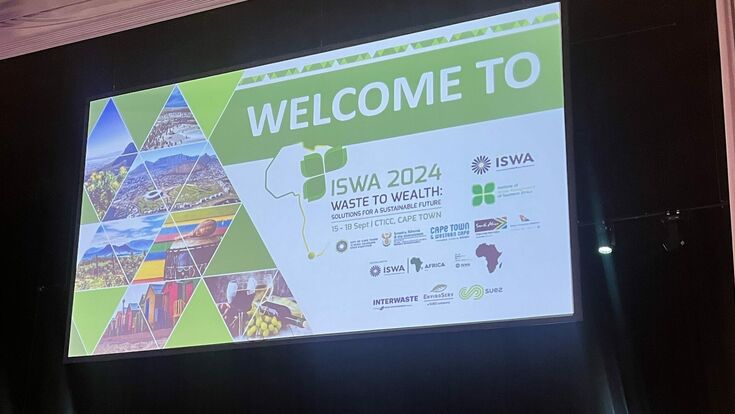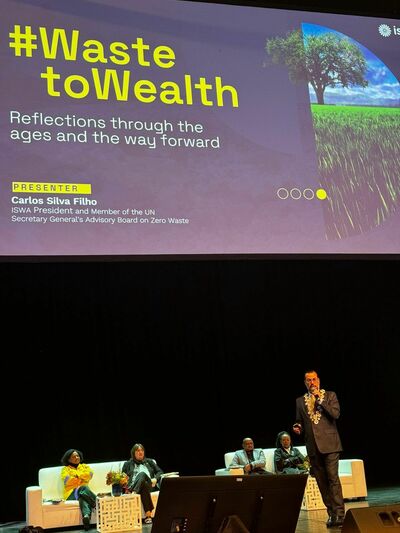ISWA2024 Day One : Siyakwamukela to the ISWA World Congress in Cape Town

The first day of the ISWA World Congress 2024 in Cape Town began with dancing and singing – luckily not by the delegates but by the Xhosa and Tshwane Cultural Dancers who woke up even those who did not manage to have their first cup of coffee.
In her opening remark, ISWA 2024 Congress Chair Mpendulo Ginindza, put emphasis on the motto of the congress: Waste to Wealth. It is, she said, essential not to see waste but the potential it presents. The following days will concentrate on thinking forward, on the future of waste management with all its challenges and opportunities. Patricia Schröder, the incoming president of IWMSA, struck the same chord. She also reminded the audience of the importance to incorporate the youth, the young professionals in future waste management plans. The focus of her presidency will be on how it is possible to change things for future generations.
Alderman Grant Twigg, Mayoral Committee Member for Urban Waste Management of Cape Town thanked ISWA and the IWMSA for bringing the Congress to Cape Town. “There are waste management challenges in South Africa, and everybody is responsible for helping solve those problems”, he said. ISWA 2024 is an opportunity to get inspired by other countries and cities and learn from their experiences. “I hope we are able to have a cleaner city, a cleaner country, a cleaner world.”
South Africa is bringing its waste management on track
In her welcoming address South African Deputy Minister of Forestry, Fisheries and the Environment Bernice Swarts said that this Congress brings together waste professionals from all over the world to network and share circular economy best practices. This allows local waste professionals to gain knowledge. The minister also shone a light on the MOU of IWMSA and the ministry to move forward to improving waste management in South Africa. Parts of this more sustainable future are an EPR scheme as well as the Waste RDI Roadmap. Also, The Climate Change Act that was signed into law last July to give a legal framework to transitioning South Africa’s transition to a low-carbon country.
ISWA's wake-up call
Outgoing ISWA president Carlos Silva Filho took the opportunity to speak with vigor about what is important to him: Waste management and its role to improve the future. “We are here to look into the future, to talk about waste to wealth”, he said. “But in order to move forward we need to reflect the past. Humans are the latest to arrive on this planet, but we have a huge impact. We caused nothing less then the triple planetary crisis: climate change, biodiversity loss, pollution.”
He gave a brief overview of how humans developed here in Africa from hunters and gatherers to settling down, founding the first settlements and populating the whole world. But, on a very low level, humans started generating waste. There are even traces of waste management activities that date back to 3.000 b.c. in Ancient Greece. Everything seemed to develop ok until the 19th century presents a turning point in health and urban planning. And the arrival of the rise of the throw-away culture in the 20th century showed there need to be changes in waste management. But what is alarming is, that mankind was not able to adapt waste management to the generation of waste. “The GMWO 2 shows that 38 per cent of the waste globally is not treated properly”, he said. “This of course has a huge socio-economic impact. It affects the most vulnerable ones. And the trend is alarming because if nothing happens in 2050 we will produce 3.8 billion tonnes of waste per year.”

The externalities of poorly managed waste are borne by all of society, so a paradigm shift is urgently needed. “We cannot solve problems with the same mindset we created the problems. Let’s have a holistic approach!” Mr. Silva demanded. “Let’s move from 3Rs – reduce, reuse, recycle - to 3Ds – decouple, decarbonize, detoxify. But to achieve this a global push is needed. The question is: How will you shape the future?”
As outgoing president of ISWA he prepared a special message: the association produced a brand new video that aims to shake people up and get them to actively participate in this paradigm shift. Watch it here!
Carlos Silva: “Let’s build a sustainable future together because to quote Nelson Mandela: It always seems impossible until it is done.”
Presenting the new ISWA president
He then handed over the president’s chain to his successor James Law. (You can read more about James in our Q&A here). The president-elect gave his first speech expressing his hope that we can see this change in our lifetime. But he also said that we need to be realistic. “Waste management does not happen overnight. We need the government to push the change, but we also need the lower levels. Change is not easy; it is every hand on board. But ISWA is an important platform to drive this change.”
Waste management in a circular economy
The morning progressed with a session focusing on circular economy. Kate Stubbs, Director Interwaste Group South Africa, said that the waste management sector plays a key role in fighting the triple planetary crisis because it can turn waste into a resource to protect the environment. The 20th-century economics was about growth only, but in that, we have poisoned our planet, she explained. Change therefore is inevitable. Especially in the face of a growing population, especially on the African continent, that brings an exponential growth in waste generation. To be able to face these challenges, collaboration has to be part of the future. To really move forward, Stubbs said and also referred to what ISWA president Carlos Silva said earlier, a shift in mindset is essential.
Stéphane Heddesheimer, CEO of SUEZ’s HazWaste Business Unit, shone a light on the problem of affordability as a major obstacle in the implementation of large-scale waste management solutions in Africa. In order to tackle the waste problem on a larger scale, a national strategy is necessary. According to him, public-private partnerships are important in the future.
Emidio Pinheiro, CEO of Mota-Engil Environment, focused on the fact that in waste management one size does not fit all, so adaptability and scalability are key.
The Global Waste Management Outlook 2024
In a special session ISWA’s on the Global Waste Management Outlook 2024 (GWMO 2) moderated by Aditi Ramola, the Technical Director at the International Solid Waste Association (ISWA), Carlos Silva Filho, Takehiro Nakamura, the Head of the International Environmental Technology Centre (IETC) of the United Nations Environment Programme (UNEP) and Zoë Lenkiewicz, the lead author of the GWMO 2, talked about the report.
In this report the authors discuss three scenarios: business as usual, waste under control and circular economy – and calculate the costs of each for the waste management sector. The models show that the cost of inaction is much higher than the funds required to address the current crisis.
One thing the authors brought up was the lack of sufficient and reliable data they encountered when working on the report. “More coordinated data production would be welcome,” Takehiro Nakamura said. “Standardisation is really difficult but I wish for more discussion about data collection, about standardization. It is important to also include the private sector, so waste collecting companies could report they data to the municipalities.”
"It is also important to collect case studies and best practices and publish them in order to inspire others!", Carlos Silva Filho added.
“One of the most startling facts is that there is no country that managed to decouple waste generation from material production”, said Zoë Lenkiewicz. “If we keep using the same solutions, the same ideas the same systems, we cannot move on and reach a circular economy. There is a cost to future generations. They are going to pay one way or another and I think it is better in cash than in other externalities.”



